democracynow.org
Stories:

Bernie Sanders: Treating Palestinians with Respect & Dignity Does Not Make Me Anti-Israel
During Thursday’s debate, Bernie Sanders repeated his assertion that Israel used disproportionate force during its 2014 assault on Gaza that killed nearly 1,500 Palestinian civilians. "If we are ever going to bring peace to that region, which has seen so much hatred and so much war, we are going to have to treat the Palestinian people with respect and dignity," Sanders said. "I believe the United States and the rest of the world have got to work together to help the Palestinian people. That does not make me anti-Israel."
TRANSCRIPT
This is a rush transcript. Copy may not be in its final form.
JUAN GONZÁLEZ: And I think that—but I was, once again, surprised, as I was during the editorial board meeting, by the courageous stand that Bernie Sanders has taken over—in New York City—over the issue of Israel and Palestine. And he has not backed down at all that he believes that there has to be, from the perspective of the United States, a more fair and evenhanded policy toward the Israeli-Palestinian conflict or to the removal of the settlements that he says are illegal in Palestinian territory. So I’ve been amazed that he has continued to maintain that position, because we know that American politicians are not exactly profiles in courage when it comes to the issue of Israel and Palestine.
AMY GOODMAN: Well, let’s go to that issue last night, a key topic during last night’s debate. This is the moderator Wolf Blitzer.
SEN. BERNIE SANDERS: We had in the Gaza area—not a very large area—some 10,000 civilians who were wounded and some 1,500 who were killed.
AUDIENCE MEMBER: Free Palestine!
SEN. BERNIE SANDERS: Now, if you’re asking me—not just me, but countries all over the world—"Was that a disproportionate attack?" the answer is, I believe it was. And let me say something else. Let me say something else. As somebody who is 100 percent pro-Israel, in the long run—and this is not going to be easy, God only knows—but in the long run, if we are ever going to bring peace to that region, which has seen so much hatred and so much war, we are going to have to treat the Palestinian people with respect and dignity. So, what is not to say—to say that right now in Gaza—right now in Gaza, unemployment is somewhere around 40 percent. You’ve got a lot of that area continues—it hasn’t been rebuilt—decimated, houses decimated, healthcare decimated, schools decimated. I believe the United States and the rest of the world have got to work together to help the Palestinian people. That does not make me anti-Israel. That paves the way, I think—
WOLF BLITZER: Thank you, Senator.
SEN. BERNIE SANDERS: —for an approach that works in the Middle East.
WOLF BLITZER: Thank you. Secretary Clinton, do you agree with Senator Sanders that Israel overreacts to Palestinian attacks, and that in order for there to be peace between Israel and the Palestinians, Israel must, quote, "end its disproportionate responses"?
HILLARY CLINTON: I negotiated the ceasefire between Israel and Hamas in November of 2012. I did it in concert with President Abbas of the Palestinian Authority, based in Ramallah. I did it with the then-Muslim Brotherhood President Morsi, based in Cairo, working closely with Prime Minister Netanyahu and the Israeli Cabinet. I can tell you right now, because I have been there with Israeli officials going back more than 25 years, that they do not seek this kind of attacks. They do not invite rockets raining down on their towns and villages. They do not believe that there should be a constant incitement by Hamas, aided and abetted by Iran, against Israel.
AMY GOODMAN: That was Hillary Clinton and Bernie Sanders last night in the Brooklyn debate, the last one before the New York primary. On Thursday, the Sanders campaign suspended its new national Jewish outreach coordinator, Simone Zimmerman, two days after she was hired, after revelations that she had posted criticisms about Prime Minister Benjamin Netanyahu of Israel on Facebook.
This is Democracy Now!, democracynow.org, The War and Peace Report. When we come back, we’ll be joined by two other guests here in Los Angeles, who, well, will debate a little of their own: Robert Scheer, the longtime veteran journalist, who is for Bernie Sanders, and Torie Osborn, longtime LGBT activist, who had been for Bernie Sanders but has switched and is for Hillary Clinton. Stay with us.... Read More →

Clinton & Sanders Debate in Brooklyn, Taking on Social Security, Superpredators, Political Judgment
In their most contentious debate of the campaign, Hillary Clinton and Bernie Sanders met in Brooklyn, New York, last night, days ahead of Tuesday’s crucial New York primary. Sanders is hoping to pull a major upset in New York and keep his streak of victories alive. He has won eight of the last nine contests. But Hillary Clinton, who served six years as a senator from New York, maintains a lead in the polls. On Thursday, they sparred over Wall Street, saving Social Security, Israel, guns and more.
TRANSCRIPT
This is a rush transcript. Copy may not be in its final form.
AMY GOODMAN: This is Democracy Now!, democracynow.org, The War and Peace Report. We’re on a 100-city tour marking Democracy Now!'s 20th anniversary. I'm Amy Goodman, broadcasting from New York—from Los Angeles, with Juan González in New York. Hi, Juan.
JUAN GONZÁLEZ: Hi, and welcome to all of our listeners and viewers around the country and around the world. In their most contentious debate of the campaign, Hillary Clinton and Bernie Sanders met in Brooklyn last night, days ahead of the crucial New York primary. Sanders is hoping to pull a major upset in New York on Tuesday and keep his streak of victories alive. He’s won eight of the last nine contests. But Hillary Clinton, who served six years—I’m sorry, eight years as senator from New York, maintains a lead in the polls. On Thursday, they sparred over Wall Street, saving Social Security, Israel, guns and more. The debate began when CNN moderator Wolf Blitzer asked Bernie Sanders about his recent comment that Hillary Clinton was unqualified to be president.
SEN. BERNIE SANDERS: Does Secretary Clinton have the experience and the intelligence to be a president? Of course she does. But I do question—but I do question her judgment. I question a judgment which voted for the war in Iraq, the worst foreign policy blunder in the history of this country, voted for virtually every disastrous trade agreement, which cost us millions of decent-paying jobs. And I question her judgment about running super PACs which are collecting tens of millions of dollars from special interests, including $15 million from Wall Street. I don’t believe that that is the kind of judgment we need to be the kind of president we need.
WOLF BLITZER: Secretary Clinton?
HILLARY CLINTON: Well, it is true that, now that the spotlight is pretty bright here in New York, some things have been said, and Senator Sanders did call me unqualified. I’ve been called a lot of things in my life. That was a first. And then he did say that he had to question my judgment. Well, the people of New York voted for me twice to be their senator from New York, and—and President Obama trusted my judgment enough to ask me to be secretary of state for the United States. So, look, we have disagreements on policy. There’s no doubt about it. But if you go and read, which I hope all of you will before Tuesday, Senator Sanders’ long interview with the New York Daily News, talk about judgment, and talk about the kinds of problems he had answering questions about even his core issue, breaking up the banks. When asked, he could not explain how that would be done. And when asked—when asked about a number of foreign policy issues, he could not answer about Afghanistan, about Israel, about counterterrorism, except to say if he had had some paper in front of him, maybe he could. I think you need to have the judgment on day one to be both president and commander-in-chief.
AMY GOODMAN: NY1’s Errol Louis questioned Hillary Clinton about the controversial 1994 crime bill, which many critics say helped fuel an era of mass incarceration.
ERROL LOUIS: Do you regret your advocacy for the crime bill?
HILLARY CLINTON: Well, look, I—I supported the crime bill. My husband has apologized. He was the president who actually signed it. Senator Sanders—
ERROL LOUIS: But what about—
HILLARY CLINTON: —voted for it.
ERROL LOUIS: But what about you, Senator?
HILLARY CLINTON: I’m sorry for the consequences, that were unintended and that have had a very unfortunate impact on people’s lives. I’ve seen the results of what has happened in families and in communities.
ERROL LOUIS: Senator Sanders, earlier this week at the Apollo Theater in Harlem, you called out President Clinton for defending Secretary Clinton’s use of the term "superpredator" back in the ’90s when she supported the crime bill. Why did you call him out?
SEN. BERNIE SANDERS: Because it was a racist term, and everybody knew it was a racist term.
AMY GOODMAN: Hillary Clinton and Bernie Sanders also sparred over the issue on how to preserve Social Security. This is CNN moderator Wolf Blitzer.
WOLF BLITZER: Secretary, let’s talk about Social Security, another critically important issue. Senator Sanders has challenged you to give a clear answer when it comes to extending the life of Social Security and expanding benefits. Are you prepared to lift the cap on taxable income, which currently stands at $118,500? Yes or no, would you lift the cap?
HILLARY CLINTON: I have said repeatedly, Wolf, I am going to make the wealthy pay into Social Security to extend the Social Security trust fund. That is one way. If that is the way that we pursue, I will follow that. But there are other ways. We should be looking at taxing passive income by wealthy people. We should be looking at taxing all of their investments.
SEN. BERNIE SANDERS: Maybe I’m a little bit confused: Are you or are you not supporting legislation to lift the cap on taxable income and extend Social Security for 58 years and increase benefits? Yes or no?
HILLARY CLINTON: I am—I have said, yes, we are going to pick the best way or combination.
SEN. BERNIE SANDERS: Oh, see? Ah! OK.
HILLARY CLINTON: Or combination of ways. You know, it’s always a little bit challenging, because, you know, if Senator Sanders doesn’t agree with how you are approaching something, then you are a member of the establishment.. ... Read More →

Juan González: Clinton Has "Really Distorted" What Happened When NY Daily News Interviewed Sanders
During Thursday night’s Democratic presidential debate, Hillary Clinton questioned Bernie Sanders’ judgment and how prepared he is to be president, citing his recent interview with the New York Daily News editorial board. Clinton said Sanders had trouble "answering questions," including one about his core issue, breaking up the banks. But is that true? Daily News columnist Juan González took part in the paper’s interviews with both Sanders and Clinton.
TRANSCRIPT
This is a rush transcript. Copy may not be in its final form.
AMY GOODMAN: Hillary Clinton and Bernie Sanders facing off last night in Brooklyn, New York, ahead of the April 19th New York primary. Juan, you were making a report card of this debate last night for the New York Daily News, and you also attended what has become very well known, is the New York Daily News editorial board meetings questioning, separately, last weekend, Hillary Clinton and, before that, Bernie Sanders. Talk about what happened in those meetings, why this New York Daily News editorial board meeting became so significant for these candidates.
JUAN GONZÁLEZ: Well, Amy, yes, I attended both of those interviews that the editorial board held with Sanders and Clinton, as well as with Republican John Kasich. Ted Cruz and Donald Trump declined to be interviewed.
But the—what I came across—what I came back with from that was significantly different from what’s been not only reported, but what Senator Clinton said last night, because she really grossly distorted what actually happened in those meetings. I think that, as I wrote in today’s Daily News, I came away with a far different impression, that, yes, that I believe that Senator Sanders did stumble somewhat in trying to explain the process by which the banks would be closed, who are—that are "too big to fail," but I don’t think—I think, overall, he handled all of the questions that were thrown at him pretty well, and I came away impressed.
And I think that the central issue is, you miss the forest for the trees when you get into the details of Dodd-Frank. The reality is that there are a couple of different ways, under Dodd-Frank, where the government can order the banks that are "too big to fail" to divest themselves of certain of their assets. There’s certainly going to be legal challenges that occur from the banks if the government or the Federal Reserve does attempt to do so. And I think that Senator Sanders made clear that there were issues that still had to be resolved that might require legislation from Congress to actually effect a reduction of these bank assets. So, I think that the—when you’re missing the forest for the trees is that Sanders continues to emphasize that there is a major problem in our financial system with these huge banks. And he was actually supported this week by the Federal Reserve and the Federal Deposit Insurance Corporation, that issued a report that these banks are still too big to fail and don’t have a credible plan for in case one of them goes—does have to go into bankruptcy, not to create a systemic risk for the financial system. So I think that the—to characterize his remarks in those editorial board meetings as being—showing him to be unfit to be president, I think, is ridiculous.
So I think that—and, as well, with Senator Clinton, in her appearance before the editorial board, did raise the issue that it’s not just the banks, but it’s—and she said this again last night—that it’s the shadow banking world, it’s the derivatives market, that also needs to be under control. But again, the FDIC and the Federal Reserve this week said that the big banks have not only gotten bigger, but they have dramatically increased their exposure to derivatives. So it’s the banks themselves that are continuing to gamble in this shadow world of derivatives.
AMY GOODMAN: And, Juan, what was it like to be in those editorial board meetings between—first with Sanders, then with Clinton? The editorial board ultimately endorsed Hillary Clinton. You actually got to ask her a question, which we played on Wednesday and went much more deeply into, around Berta Cáceres, the assassinated Honduran indigenous leader who was killed just weeks ago.
JUAN GONZÁLEZ: Yes, and I did manage to get a question in to Bernie Sanders, as well. But, you know, I am not a member of the editorial board. I’m a senior columnist at the paper, so I get invited sort of to watch a maybe ask a question or two when the other members of the editorial board have finished asking their questions. But I do think that, generally speaking, the characterization of what happened in the Sanders interview has been—and interestingly, several members of the editorial board told me that they were surprised by the furor that developed afterwards, which was largely fueled by the Clinton campaign and their surrogates, who began to spread word through social media and others, pointing to what they believe were these huge errors of Senator Sanders.
AMY GOODMAN: And how do you think that the candidates fared last night in the debate?
JUAN GONZÁLEZ: Well, I think, generally speaking—I was asked to do a scorecard by the newspaper, and I feel, overall, that Bernie Sanders did better on the debate, although I was surprised how weak he was on responding to the issues of the banks and the financial industry and dealing with them. I think he could have been stronger there. I think that Hillary Clinton was definitely stronger on a bunch of issues, including the—obviously, the issue of guns in the country. ... Read More →

Robert Scheer v. Torie Osborn: A Heated Debate on Sanders vs. Clinton with Two Longtime Progressives
We host a debate on the 2016 election between two longtime progressives: Robert Scheer, a veteran journalist, and Torie Osborn, a progressive activist. Scheer worked for almost 30 years with the Los Angeles Times, where he interviewed several former U.S. presidents, including Ronald Reagan and Bill Clinton. Osborn has served as Northern California director for the National Organization for Women and was the first female executive director of the Los Angeles Gay and Lesbian Center.
TRANSCRIPT
This is a rush transcript. Copy may not be in its final form.
AMY GOODMAN: I’m Amy Goodman in Los Angeles. Juan González is in New York. And our guests are here in Los Angeles. We’re joined by Robert Scheer, longtime journalist based in California who’s editor-in-chief of Truthdig. His most recent book, They Know Everything About You: How Data-Collecting Corporations and Snooping Government Agencies Are Destroying Democracy. And Torie Osborn joins us, longtime progressive activist based in Los Angeles. She’s served as Northern California director for the National Organization for Women and was the first female executive director of the Los Angeles Gay and Lesbian Center.
We welcome you both to Democracy Now! It’s great to have you with us. Juan?
JUAN GONZÁLEZ: I’d like to start with Bob Scheer. You’ve written a lot about our financial system and the banks, and, of course, this is a central issue between Hillary Clinton and Senator Sanders in this campaign. Your response to the controversy around Senator Sanders’s stance and Hillary Clinton’s position on how to deal with the nation’s biggest banks?
ROBERT SCHEER: Well, I think Hillary Clinton was exposed last night as a serious demagogue on the banking issue. It was unbelievable to me. She knows. She raised the question—or she made the statement, "We can never let Wall Street wreck Main Street again." Well, who did it the first time? It was her husband, in alliance with Phil Gramm of the Republicans, who reversed Glass-Steagall and opened the door to the "too big to fail." It was her husband, by the way, who signed the bill into law, that she accuses Bernie Sanders of having somehow engineered. And that was the Commodity Futures Modernization Act, which Bill Clinton and Lawrence Summers, his Treasury secretary, and Phil Gramm pushed through Congress. He did it as a lame-duck president. It’s that legislation, tucked into an omnibus bill, so only four people in the House voted against it. Ron Paul was one of them, on the libertarian side. Yes, Bernie Sanders went along with this threat that if you don’t vote for the omnibus bill, people don’t get paid, and so forth and so on. It was Bill Clinton’s bill.
She has done this now repeatedly, blaming Bernie Sanders for the failure to regulate credit default swaps and collateralized debt obligations—all of this junk which was made legal by a bill pushed by Bill Clinton, signed into law by Bill Clinton, and, I believe, done to enhance her coming race for the Senate in New York, where she got an enormous amount of money from Wall Street. Bill Clinton’s first Treasury secretary, Robert Rubin, was at that point ensconced at Citibank—Citigroup, a bank allowed to form because of the reversal of Glass-Steagall, a merger of investment and commercial banks. So, she knows what’s been going on. And to blame Bernie Sanders—I covered this for the L.A. Times. I wrote a book on it called The Great American Stickup. I know the record very well. And she’s simply lying about it.
AMY GOODMAN: Torie Osborn?
TORIE OSBORN: Well, I’m not an expert on the economy, but I will tell you that Dodd-Frank is the law of the land. Hillary Clinton has been really clear. She stood up to Big Pharma back when Hillarycare was killed by Big Pharma and the insurance companies. She’s a fighter. She has positioned herself center-left. She’s going to be elected president of the United States. And I think the real issue is: How do we go forward? I like Paul Krugman. I agree with Paul Krugman, who is her economic guru. She’s definitely moved to the left from her husband’s positions. She’s not going to put Richard—Robert Rubin in as her Treasury secretary. I think that it’ll be fascinating to see how she incorporates the growing progressive economic equity part of the Democratic Party that Bernie has brilliantly organized and mobilized.
So, to me, what’s most important is that Hillary is—she’s progressive. She’s a leader. She has a far better track record of actually getting things done than Bernie Sanders, who I knew very well in Vermont. He’s given the same speech now that he gave back in 1974. I lived there from '70 to ’76 in my early days of antiwar and feminist activism and sort of formative days, when he was working the Liberty Union Party. And I'll tell you, I don’t think he’s changed. Now, economic inequality has grown. His message has become more relevant. I’m glad he’s raising it.
You know, to me, the most interesting thing about the debate last night, the most interesting thing, besides the Israeli-Palestinian issue, which I do want to say was astonishing and a thing of beauty, that he had the courage to say what he did. But it was that there was a—that he—that we were fighting about $12 or $15-an-hour minimum wage. I mean, I worked at the—on the county raising to $15 an hour. It was only two years ago here in Los Angeles that Mayor Garcetti put forward $13.25. It seemed radical at the time. Passed the baton over to the labor movement, the Fight for 15, you know, swept through, and now California—now Jerry Brown has signed the law. I’m telling you that what’s important here is that we’re having a debate about $12 to $15 an hour, not whether Hillary believes, as many progressive economists do, that it might be too much of a burden on some rural and small business economies if you move too quickly to $15. So, you know, I think the issue of Wall Street, I think there’s—you know, good progressives disagree. Is the shadow banking industry as important as breaking up the big banks? How do you break them up? What are the tools within Dodd-Frank? How can you make Dodd-Frank perhaps more progressive? Well, you’ve got to change Congress first.
AMY GOODMAN: I just wanted to clarify something, Torie Osborn. Had you ever been for Bernie Sanders or—
TORIE OSBORN: I was magnetized. Now, I am not—the way it works for me in a campaign, it was true in 2008, I was for John Edwards, actually, because the poverty and the war were my issues. Then I was for Hillary, and then I was magnetized and became a strong Obama supporter. I quit my job in City Hall working for Mayor Villaraigosa and joined the Bernie—joined the Obama campaign as a full-time super volunteer for two months. This time, Hillary declared last April, and I listened to every word of her. I was checking her out, and I was actually pleased to see she talked about Wall Street, she talked about Big Pharma, she talked about healthcare reform, she talked about universal healthcare, she talked about free tuition or making tuition more accessible. And I thought, "Wow, she’s really hitting the economic issues." Bernie then entered the race, and I thought, "Well, I’ve known him for many years. All my lefty friends are for him. I’m going to be for Bernie." And there was less there than met the eye, for me. I have tremendous respect for the movement he’s built, for the secular revival, the political social movement that he’s built. And I have lots of questions about how that energy can be captured on a going-forward basis.
AMY GOODMAN: Bob Scheer, you disagree with Torie Osborn.
ROBERT SCHEER: Come on, let’s look at what the Clintons represent: triangulation, ending the Roosevelt legacy in the party, reversing the—
TORIE OSBORN: That was then. This is now.
ROBERT SCHEER: Reverse—understand, that the—
TORIE OSBORN: That was the 1990s. We’re not in the ’90s, Bob.
ROBERT SCHEER: But the policies that were in place—
TORIE OSBORN: But the policies that Hillary Clinton is putting forward—
ROBERT SCHEER: Are you going to allow me to finish?
TORIE OSBORN: —is not the same.
ROBERT SCHEER: I know. I know. And look—
TORIE OSBORN: Don’t blame her for Bill Clinton.
ROBERT SCHEER: OK, you mentioned—
TORIE OSBORN: It’s not fair.
ROBERT SCHEER: —you worked for Antonio Villaraigosa, a fellow I know well. You obviously work for Sheila Kuehl now, a supervisor. They’re nice people. The fact is, it was Mayor Villaraigosa that ordered the police to smash the Occupy movement in Los Angeles. I was there that night. I was out in the street. It was barbaric. It was brutal. And yes, progressive mayors in every city, most of whom were Democrat—I guess one in New York who claimed to be a Republican—and they smashed this movement. It’s because of that movement, which addressed a problem that has accelerated since the Clintons came to office—you could guess, Ronald Reagan was not able to put through the kind of radical deregulation he was speaking about. Bill Clinton did the triangulation. And that income gap in America, that Bernie Sanders was warning about, has mushroomed.
And let me just say something. You say you followed Hillary Clinton’s career. I interviewed Hillary Clinton. I interviewed her husband when I was working for the L.A. Times down in Arkansas. They championed the slogan—both of them—championed the slogan, "Let’s end welfare as we know it." And what they did is they ended the main federal anti-poverty program, the aid to families with dependent children. Seventy percent of the people on that program were children. Seventy percent were children. They claimed they had a program in Arkansas called Project Success that was helping people get off of that. It was a nonsense program. It never happened. It never worked. OK? Peter Edelman—she always says, "I work with the Children’s Defense Fund, Marian Wright Edelman." Peter Edelman was in the Clinton administration. He broke over this question of so-called welfare reform. He’s written a devastating book. Robert Reich was the secretary of labor in the Clinton administration. He is supporting Bernie Sanders. Why? Because he saw the inside of Clinton triangulation. On domestic policy, it’s been a total caving in to Wall Street. And this income disparity, which Bernie Sanders was warning about, you say, back in the '70s, has become an uglier reality now. And you're saying we should trust the very people who opened the door to Wall Street to now solve the problem. I think it’s utter nonsense.
And let me say something about Israel, as a Jewish person, by the way. I am so proud that the first Jewish candidate that has a chance of being president has unmasked this terrible policy of ignoring the human rights of Palestinians, their aspiration, and backing Netanyahu, a guy who just doesn’t even believe, in any serious way, in the two-state solution. And by the way, Hillary mentioned Mohamed Morsi, a graduate of the University of Southern California. He got his doctorate there. And she said, "I talked to him." Why doesn’t she mention that he’s in jail facing death? The first elected person to run Egypt is in jail facing death, and that Hillary Clinton was part of an administration, and after this administration, she has supported an accommodation with the military rulers of Egypt that have totally reversed that Democratic experiment. So, this is utter nonsense. The woman is a Margaret Thatcher hawk on foreign policy.
She carries water for Wall Street. You talk about the shadow economy. My god, her sun was set in business with a hedge fund by Lloyd Blankfein from Goldman Sachs. You know, and, by the way, her top financial adviser, Gary Gensler, was a Goldman Sachs partner, went into the—was in the Clinton administration, was part of this whole deregulation of Wall Street. He’s calling the shots in her campaign on the economy.
TORIE OSBORN: Well—
ROBERT SCHEER: And she still turns to those very same people. So you can’t whitewash that record. It’s real.
TORIE OSBORN: I don’t—I agree.
JUAN GONZÁLEZ: I want to—if I can, I’d like to ask both Bob Scheer and Torie Osborn about this whole issue—it’s true, I completely agree, that a political leader can change and can adopt more progressive or less progressive positions over time. But I’m wondering how much of the change in viewpoint of some of the centrist Democrats—and I would classify both Governor Cuomo right here in New York and Hillary Clinton in that camp of formerly centrist Democrats—have been affected by this enormous grassroots movement that has developed, from the DREAMers to the Fight for 15, to the Occupy movement, to the climate—the movement around climate change—these massive movements all around the country. How much of these centrist leaders have changed their positions in order to remain relevant to the changing nature of political thought among the masses of American people?
TORIE OSBORN: Well, I agree with you, and I think the reason that Hillary Clinton positioned herself center-left—and, by the way, you govern from the center-left. You do not govern from the left, as Bernie’s marginal status in Congress for 30 years shows. I mean, he has done nothing. He did nothing before he was elected mayor of Burlington, and he has done very, very little. Seventeen amendments and two Post Office bills is not a track record that is substantive in Congress. But I agree with you, and I completely agree with you. And this is why I think rather than railing at the past, at the Clintons of the past, who carried the water for the right on criminal justice and on welfare reform—I completely agree with it—and set in motion a piece of what the right wing, starting, you know, in the '60s and coming to fruition in 1980 with Ronald Reagan and beyond, had continued to rig the system, to change the system, to, you know, not just mass incarceration and the, you know, racism and what we've seen in the growing prison-industrial complex, but, of course, the economic injustice—but here’s where I completely agree with you.
When Hillary gave her speech a year ago, and that I was—I listened to every word. I was hanging on every word, because I wanted to believe that a woman could be president. I want—I would have rather it was Elizabeth Warren, frankly, but it wasn’t. It was Hillary Clinton. And I wanted to see: Was she going to talk about issues that matter to me, as a 40-year progressive activist? And she did. And it’s because of the DREAMers, the DREAMers. It’s because of the marriage equality struggle. It’s because of Black Lives Matter. It’s because of—and I don’t know if I would agree with you characterizing them as mass movements, but I think that they’ve been effective and powerful and important movements. And I think they have changed the debate, as Occupy changed the debate, and forever, on 1 percent and 99 percent. But that’s really the question.
Guys, I mean, I hate to tell you, but Hillary Clinton is going to be the next president of the United States. Bernie Sanders, I think, has galvanized and unleashed young people. He’s not going to win. He’s not going to win New York, Pennsylvania or California. And so, the question really is: What happens next to those of us in the progressive movement?
AMY GOODMAN: Very quick comment from Robert Scheer, as we wrap up.
ROBERT SCHEER: Yeah, well, I think this is how we got into this mess. Jerry Brown, when he was running against Bill Clinton, said we’re always faced with the—by these people with the—not the lesser of two evils, but the evil of two lessers. That’s a line I’m taking from my wife’s book on California that’s coming out. But it’s a good statement. They helped get us into this mess. Let’s not miss what this election is all about on the Republican and Democratic side. On the Republican side, you have a neofascist person in Trump, in the form of Trump, and something of a religious fanatic in Ted Cruz. But they are addressing real discontent across the board. The economy is not working for most Americans. OK? And so, there’s a right-wing populist appeal that is wiping away the Republican Party. On the Democratic side, much to the amazement of everyone, Bernie Sanders has been able to register a populist progressive dissent. OK? He is a uniter. He doesn’t bait immigrants. You know, he understands the need for unity in the country. But the fact of the matter is, if you go for Hillary Clinton, you go for more of the same. I’ll tell you my takeaway from the debate—
TORIE OSBORN: She’s going to win.
ROBERT SCHEER: I want to tell you, my—
TORIE OSBORN: Facts.
ROBERT SCHEER: Yeah, but your winning—
TORIE OSBORN: Get real.
ROBERT SCHEER: Your—get real. Your winning got us—
TORIE OSBORN: The change happens—
ROBERT SCHEER: Your winning gets us into a war in Iraq—
TORIE OSBORN: No.
ROBERT SCHEER: —which Democrats supported, with Republicans—
TORIE OSBORN: Not if we do our work.
ROBERT SCHEER: —that has—well, you—if we do our work. The fact is, sellout politics have made the situation much more treacherous. And the reason—
TORIE OSBORN: And marginal lefties can’t govern.
ROBERT SCHEER: And the reason so many young people are against it is because they see it doesn’t work for them. And if you want to look at the record, if Hillary Clinton—these problems, what is she doing? You talk about deportation, yes, Obama has—
TORIE OSBORN: She’s not going to deport.
ROBERT SCHEER: —failed on immigration. He has been called the deporter-in-chief.
TORIE OSBORN: Yes.
ROBERT SCHEER: Hillary Clinton, as secretary of state, she supported that policy. She didn’t—no, take the minimum wage—
TORIE OSBORN: The president set—
ROBERT SCHEER: You keep telling me Hillary Clinton has evolved. The Clintons have been in power in the Democratic Party for so long. Why didn’t they move on the minimum wage? Why didn’t they move in a more peaceful area—
TORIE OSBORN: Because, as you know, it takes a movement from below to push the issue forward.
ROBERT SCHEER: No, they’re not pushable. They are sellouts. They are co-opted. They—
TORIE OSBORN: That’s not true. She’s clearly pushable.
ROBERT SCHEER: The record is so clear.
TORIE OSBORN: She supports $15 an hour.
ROBERT SCHEER: She supports it now because she’s going to lose the primary if she doesn’t come out for it.
TORIE OSBORN: No, that’s not true. She—
ROBERT SCHEER: And she supported it last night very halfheartedly. What you are talking—
TORIE OSBORN: That’s not true. She stood up there with Governor Cuomo.
ROBERT SCHEER: Look, let me tell you, if you go down the road with Hillary Clinton—
TORIE OSBORN: Don’t rewrite the record.
ROBERT SCHEER: If you go down the road with Hillary Clinton, the right wing will be stronger. That’s what happened in Europe—
TORIE OSBORN: No, that’s not true.
ROBERT SCHEER: —historically.
TORIE OSBORN: It’s not the worse, the better.
ROBERT SCHEER: It’s what’s happening in Europe now. The fact of the matter is—
TORIE OSBORN: No.
ROBERT SCHEER: —if you do not address the problems from a progressive side, which Bernie Sanders is proposing, you’re going to leave people hurting.
TORIE OSBORN: No.
ROBERT SCHEER: They’re hurting in this country. You may not be hurting working for—
TORIE OSBORN: No.
ROBERT SCHEER: —the county and the supervisor, part of the Democratic establishment. I know. I live downtown.
TORIE OSBORN: Right, I’m the Democratic establishment.
ROBERT SCHEER: It was the Democratic establishment.
TORIE OSBORN: Forty years of progressive activism, Bob. Come on.
ROBERT SCHEER: You work for the supervisor.
TORIE OSBORN: I work for the supervisor—
ROBERT SCHEER: Yes.
TORIE OSBORN: —who’s a progressive supervisor, who’s pushed more—
ROBERT SCHEER: And the Democratic establishment—the Democratic establishment in Los Angeles, by the way, has a racist—
TORIE OSBORN: Bob.
ROBERT SCHEER: —tolerated—the supervisors tolerated—
TORIE OSBORN: Bob.
ROBERT SCHEER: —a racist sheriff’s department, a racist police department—
TORIE OSBORN: Sheila was elected last year.
ROBERT SCHEER: —crushed Occupy—
TORIE OSBORN: Bob, that—
ROBERT SCHEER: —did not address any of these questions—
TORIE OSBORN: You’re missing—you’re missing the question.
ROBERT SCHEER: —whatsoever.
TORIE OSBORN: The question—
ROBERT SCHEER: And now you tell us we need more of the same.
TORIE OSBORN: The question—no.
ROBERT SCHEER: The voters are rejecting more of the same. That’s what’s going on.
TORIE OSBORN: No, they’re not.
ROBERT SCHEER: Yes. You represent more of the same.
TORIE OSBORN: Hillary has gotten—
ROBERT SCHEER: That’s what Hillary Clinton is.
TORIE OSBORN: —two-and-a-half million more votes.
AMY GOODMAN: We’re going to leave it there, but clearly there is a lot to talk about in these coming weeks and months. Robert Scheer, editor-in-chief of Truthdig; Torie Osborn, longtime progressive activist who’s served as Northern California director for the National Organization for Women and was executive director of the Los Angeles Gay and Lesbian Center, the National Gay and Lesbian Task Force and the Liberty Health Foundation.
This is Democracy Now! When we come back, our own journalists are arrested last night covering the anti-Trump rally in New York. Stay with us.
[break]
AMY GOODMAN: "On the Road Again," Willie Nelson, and that’s just where we are, on the road again, on a 100-city tour. Check our website for where we’re headed next, here in Los Angeles, in Northern California, the Salt Lake City and Colorado. This is Democracy Now!, democracynow.org, The War and Peace Report. I’m Amy Goodman in Los Angeles. Juan González is in New York. ... Read More →

"First Amendment Rights!" Two Democracy Now!Journalists Arrested Filming Anti-Trump Rally in NYC
Police arrested more than two dozen people at the anti-Trump rally in Manhattan Thursday night, including Democracy Now!’s own videographers, Charina Nadura and Juan Carlos Dávila. They were taken into custody as they attempted to film the protest, and held for hours. After being released, they spoke out about what happened.
TRANSCRIPT
This is a rush transcript. Copy may not be in its final form.
AMY GOODMAN: Police arrested more than two dozen people at the Trump protest, including Democracy Now!’s own videographers, Charina Nadura and Juan Carlos Dávila, who were taken into custody as they attempted to film the protest. After being held for hours, they spoke last night about what happened.
PROTESTERS: Hey, hey, ho, ho! Donald Trump has got to go!
CHARINA NADURA: My name is Charina Nadura, and I’m working for Democracy Now! Tonight, we were filming a protest against Donald Trump at Grand Central, and me and my colleague, Juan Carlos, was following these protesters near 42nd Street who were trying to get inside the Hyatt hotel.
JUAN CARLOS DÁVILA: My name is Juan Carlos Dávila. As we were crossing the bridge in front of the Grand Central Station, arrests started happening.
POLICE OFFICER 1: Get back! Get back!
CHARINA NADURA: At the moment where Juan Carlos was filming the arrests of NYPD while they were beating up some of the protesters—
POLICE OFFICER 2: They have to be able to film. They have to be able to film. They have to be able to film. They have to be able to film.
CHARINA NADURA: —I was holding my microphone, and Juan Carlos was holding the camera. And we were—we had our badges on our neck, and we kept saying, "Press!"
Press! First Amendment rights! First Amendment rights!
And as we were saying this, they didn’t care. They grabbed the camera off Juan Carlos’ hand, and they grabbed the microphone off my hand, and they slammed us on the ground. And they said, "You can’t film here. You can’t film here."
POLICE OFFICER 3: You have to move back.
PROTESTER: I’ve got to get my pump! I can’t breathe! I have asthma!
POLICE OFFICER 3: You have to move back. You’re interfering. Put the camera down. Bring it down.
JUAN CARLOS DÁVILA: All right.
POLICE OFFICER 3: Put the camera down. Bring it down.
POLICE OFFICER 4: All right, you’re under arrest.
CHARINA NADURA: The moment later, I saw Juan Carlos’ face on the ground with dirt all over his forehead, and about two to three police officers were on top of him and handcuffing him.
JUAN CARLOS DÁVILA: They threw me to the ground. They slammed my head against the pavement. And they twisted my arm. And, I mean, my wrists are red. Part of them are bleeding.
CHARINA NADURA: They took us here and put us in jail.
AMY GOODMAN: That was Charina Nadura and Juan Carlos Dávila, two Democracy Now! journalists who were arrested by police last night as they were filming the arrests and the protests at the anti-Trump rally in New York City.
In our last minute we have left, we’re still with Robert Scheer. You wrote the book, They Know [Everything About You]: How Data-Collecting Corporations and Snooping Government Agencies Are Destroying Democracy. What about this crackdown on journalists? They were arrested for five hours.
ROBERT SCHEER: And the perversion of this war on terror has become a war on the American people. Local police departments now have Palantir. So does New York, L.A. It’s mining data. This was formed by the CIA, not discussed. Local police departments get heavy duty equipment now. They’re able to spy on movements, infiltrate movements with the new technology—anybody who might dissent. We saw that in the crushing of the Occupy movement. It’s quite ominous. And unfortunately, Democrats, Senator Dianne Feinstein, Barack Obama, have been instrumental in doing this. They have not protected our civil liberties. And as a result, the police can run wild. And that’s what you saw there.
AMY GOODMAN: Juan, you know, you were calling in. I was calling in. Sam Alcoff, our video producer, was calling in and went down to get Charina and Juan Carlos out of jail. Unacceptable that they were arrested last night.
JUAN GONZÁLEZ: Yes, it is, because, clearly, we need to have journalists in the field and in the streets to be able to present this information and these events to the public. So it’s another sad day, unfortunately, when these young journalists and workers here for Democracy Now! were arrested.
AMY GOODMAN: Robert Scheer, final comment? Again, your book, They Know Everything About You.
ROBERT SCHEER: Yeah, look, we have accepted a surveillance state, an Orwellian state, in which we are the enemy—"we" being any whistleblower, any dissenter. You know, Hillary Clinton can say that Edward Snowden is a traitor because he informed us what’s going on. You have Microsoft now telling us the government won’t even let us—Microsoft tell us they’re snooping on our email. And so you have a surveillance society of vast proportions, technologically informed, a great amount of data, and it can be used to intimidate the public. And what you saw attacking Democracy Now! reporters is the pattern for the future.
AMY GOODMAN: I want to thank you, Robert Scheer, again, author of They Know Everything About You.
That does it for our show. A very special thanks to the folks here at KCETLink in Los Angeles and to Kim Spencer. We’re continuing our 100-city tour. Today we’ll be at Skylight Books in Los Angeles and Bookstar in Studio City tonight. I’ll be on Bill Maher’s show tonight on HBO. On Saturday, we’ll be in Santa Rosa, Willits and Redway; and on Sunday in Davis, Chico and Berkeley. Then we’re on to Salt Lake City on Monday, Idaho Springs, Colorado, on Tuesday. We’ll be in Colorado.
That does it for our broadcast. A special thanks to Charina Nadura and Juan Carlos Dávila, who were simply doing their jobs on the streets of New York last night. ... Read More →

"No Racism in New York": 1,000 People Rally Against GOP Front-Runner Donald Trump in Manhattan
As Hillary Clinton and Bernie Sanders faced off in Brooklyn, about 1,000 New Yorkers rallied across the East River in Manhattan to protest Republican front-runner Donald Trump. Protesters gathered outside the Grand Hyatt Hotel, where Trump spoke at a Republican gala. Democracy Now! was there and spoke with some of the anti-Trump protesters.
TRANSCRIPT
This is a rush transcript. Copy may not be in its final form.
JUAN GONZÁLEZ: While Hillary Clinton and Bernie Sanders debated in Brooklyn, across the East River in Manhattan there was another political event. About a thousand people rallied outside the Grand Hyatt Hotel to protest an appearance by Republican presidential front-runner Donald Trump at a Republican gala. Democracy Now! was there to cover what was happening in the streets.
PROTESTER 1: We stand here today to tell Donald Trump, to tell everybody, white supremacy is not accepted in New York City. Black lives matter. Trump, you’re a capitalist. No racism in New York.
PROTESTER 2: My name is [inaudible]. I’m coming here from MPower Change. As a Muslim American, as a New Yorker, as a daughter of immigrants, we know what Donald Trump means. And we cannot stand for the continuation of these policies that are affecting our people, because when Donald Trump spouts racist rhetoric in his speeches, he’s talking directly about me, he’s talking directly about you, he’s talking directly about all of us.
PROTESTERS: Trump, KKK! Racist, sexist, anti-gay!
JAKE MAIER: My name is Jake Maier. I’m with Iraq Veterans Against the War, IVAW. I served in the Marine Corps from 2011 to 2015. And I’m here as part of the Vets vs. Hate campaign to protest the hate speech that we are seeing in this country. Donald Trump is the worst right now. Ted Cruz is also really bad, but they are just symptoms of a much larger problem, and they’re tapping into a sentiment in this country. And we, as veterans, need to speak out against hate against groups like Mexican immigrants, like women, hate speech against women, against the LGBT community, and especially hate speech against Muslims, because we know what hate speech can do, and we’ve seen firsthand the disastrous after effects.
KERBIE JOSEPH: My name is Kerbie Joseph. I’m a member of the Justice for Akai Gurley Family Committee. We’re out here peacefully. And what do they look like? Cowards! Who are they protecting? Not us. What are they standing in front of? Their property. We have to understand that it’s all connected. Racism is not different from economic injustice. It’s all part of this system called capitalism.
PROTESTERS: Hey, hey, ho, ho! Donald Trump has got to go!
JOSÉ GARCÍA: So, my name is José García, and I’m an organizer with ICE-FREE NYC. And so, I was out at the protest because Donald Trump is very anti-immigrant, and my group is a group that’s organizing for immigrant rights. This is beyond a kind of singular issue. This is a moment for communities to really come together and organize together, because that’s really what’s going to get us free. Mostly the people who are on the ground and put their bodies on the line were black, brown, indigenous, queer and trans organizers.
We live in a country where an openly racist white supremacist could potentially be the president come January. We live a country where black, brown and indigenous people leave their homes and leave their families in the morning and are not sure if they’re going to come back, because of the police. We live in a country where Immigration and Customs Enforcement regularly kidnaps people without documentation, and with no accountability whatsoever. And so, what you’re seeing across the country, in New York City and Chicago and in all these other places, is not a response to U.S. electoral politics. We’re not—we’re not organizing voters. We’re organizing people who are oppressed by a system that allows people like Trump to get really close to the presidency. So, again, we’re not responding to Trump. We’re responding to a system that allows this to happen. ... Read More →
Headlines:Workers Strike in Over 300 Cities in Record Fight for $15 Action
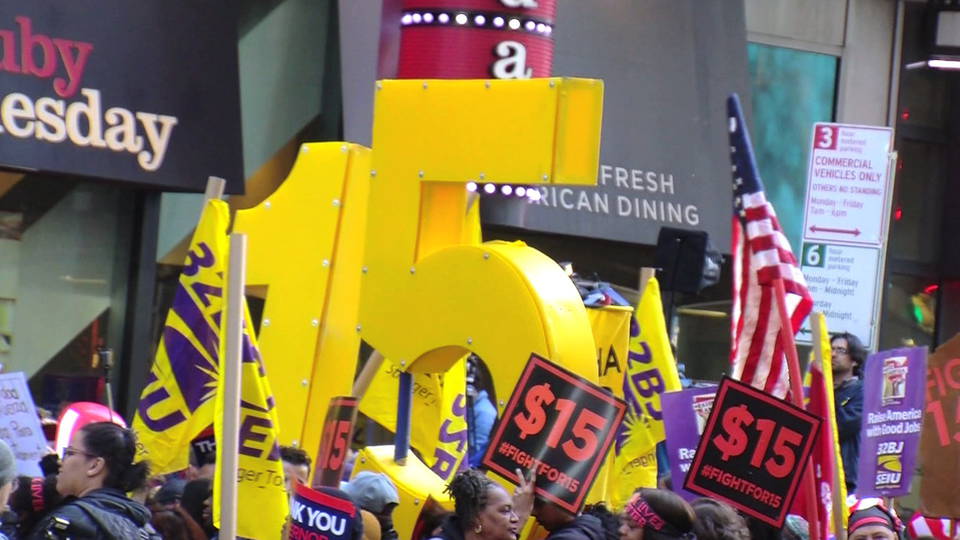
Low-wage workers across the country walked off the job in more than 300 cities Thursday, marking the largest action to date in the growing nationwide fight for a $15-an-hour minimum wage. The Fight for 15 has brought together fast-food and childcare workers, adjunct professors, healthcare workers and many more. Thursday’s protests followed victories in California and New York, which have become the first states to enact a path toward establishing a $15-an-hour minimum wage in the coming years.
TOPICS:
Labor
U.S. Labor Protests
Sanders, Clinton Spar over Minimum Wage at Brooklyn Democratic Debate
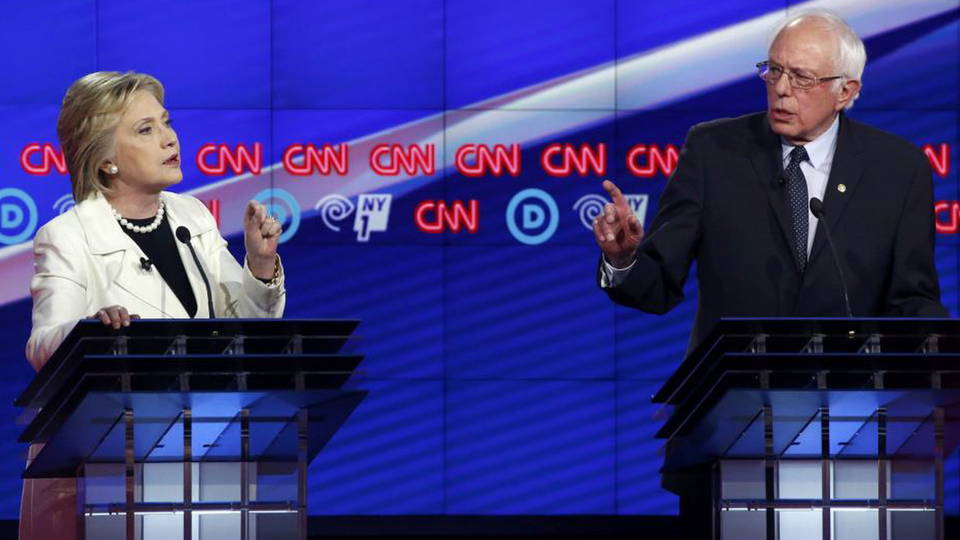
The Fight for 15 took center stage at Thursday night’s Democratic debate in Brooklyn, New York. In their most contentious debate of the campaign, Hillary Clinton and Bernie Sanders faced off over Wall Street, saving Social Security, Israel, guns and more. CNN moderator Wolf Blitzer asked Clinton if, given her support for a $12-an-hour minimum wage, she would sign a bill raising it to $15 an hour.
Wolf Blitzer: "If a Democratic Congress put a $15 minimum wage bill on your desk, would you sign it?"
Hillary Clinton: "Oh, of course I would. And I have supported—I have supported the Fight for 15. I am proud to have the endorsement of most of the unions that have led the Fight for 15."
Sen. Bernie Sanders: "I am sure a lot of people are very surprised to learn that you supported raising the minimum wage to 15 bucks an hour."
TOPICS:
Bernie Sanders
Hillary Clinton
2016 Election
1,000 Protest Trump in NYC; 2 Democracy Now! Videographers Arrested
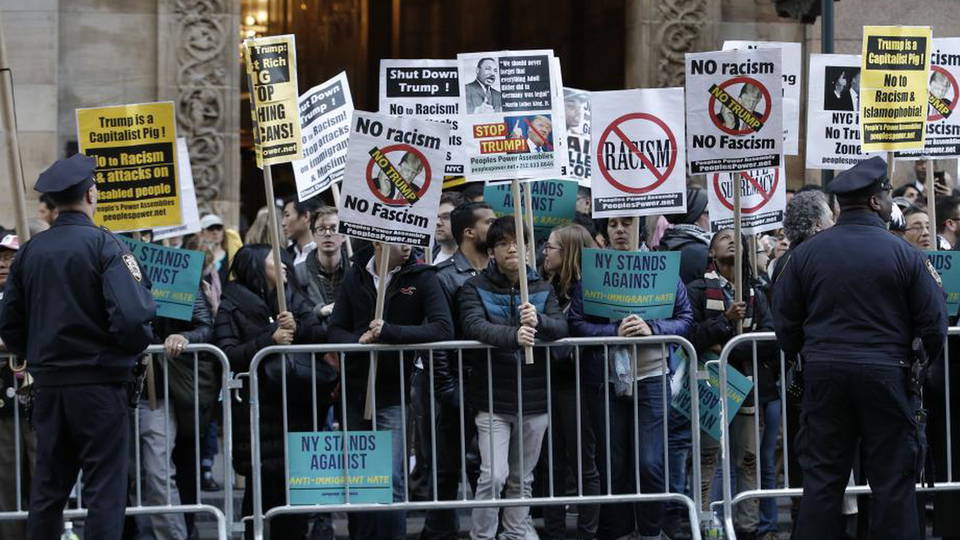
In New York City, about 1,000 people rallied outside the Grand Hyatt Hotel Thursday to protest an appearance by Republican presidential front-runner Donald Trump at a Republican gala. Wilhelmina Perry was among those condemning Trump’s racism.
Wilhelmina Perry: "I think that the direction in which Trump has taken the country and exploded the negativity and the racism and the classism that we know exists—but it is not all right to deal on those values—he’s made it appropriate to do it. And I think that that is terrible. I don’t want to live in that kind of country, and I don’t want to see young people behind me have to struggle with that kind of a country."
Police arrested more than two dozen people, including Democracy Now!'s own videographers, Charina Nadura and Juan Carlos Dávila, who were taken into custody as they attempted to film the protest. We'll have more on the action and their arrest later in the broadcast.
TOPICS:
Police
Donald Trump
Trump Campaign Manager to Avoid Prosecution for Battery
Donald Trump’s campaign manager Corey Lewandowski will avoid prosecution for battery after video showed him grabbing Breitbart reporter Michelle Fields as she tried to question Trump. Fields said Lewandowski bruised her arm. But prosecutors in Florida, where the incident took place, said there is not enough evidence to pursue criminal charges.
TOPICS:
Donald Trump
2016 Election
Brazil's Supreme Court Rejects Bid by President Rousseff to Avoid Impeachment Vote
Brazil’s Supreme Court has rejected a last-ditch effort by President Dilma Rousseff to avert a looming impeachment vote. Rousseff’s attorney general had sought to prevent lawmakers in Brazil’s lower house from voting this Sunday, amid reports her opponents have enough votes to advance the impeachment. The Senate would then vote on whether to put Rousseff on trial on accusations of breaking budget laws. Rousseff has accused her right-wing supporters of attempting a "coup." Many of the lawmakers leading the impeachment charge face serious corruption and fraud charges of their own.
TOPICS:
Brazil
GOP Senator Calls for Reopening U.S. Military Base on Puerto Rico's Vieques Island
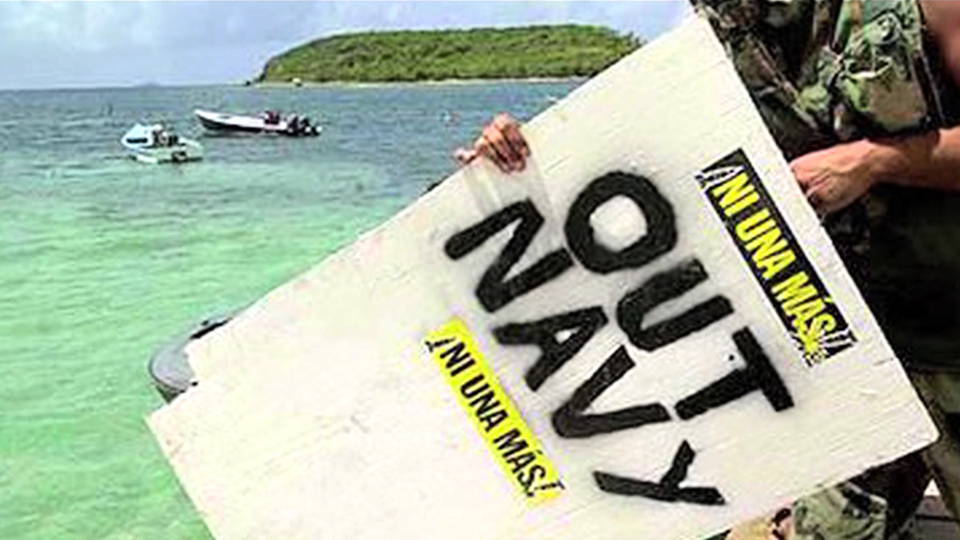
Republican Oklahoma Senator Jim Inhofe has recommended reopening the U.S. military base on Vieques Island in Puerto Rico as Congress considers legislation to address Puerto Rico’s debt crisis. For decades, the Navy used nearly three-quarters of Vieques for bombing practice, war games and dumping old munitions, leading to lasting environmental damage. The Navy ended training operations in 2003 following a massive civil disobedience campaign. But speaking this week, Senator Inhofe suggested reopening the base on Vieques would benefit the U.S. military and the Puerto Rican economy.
Sen. Jim Inhofe: "I would think that any kind of a deal that is made is going to have to include consideration for the training that is still available. I mean, there’s still no range like Vieques anywhere in the Western Hemisphere. What can be done in Vieques cannot be done on one location by a joint force."
Senator Inhofe is best known for bringing a snowball to the floor of the Senate in an effort to debunk global warming.
TOPICS:
Puerto Rico
Report: UC Davis Spent $175,000 Trying to Scrub Reports on 2011 Pepper-Spraying of Students
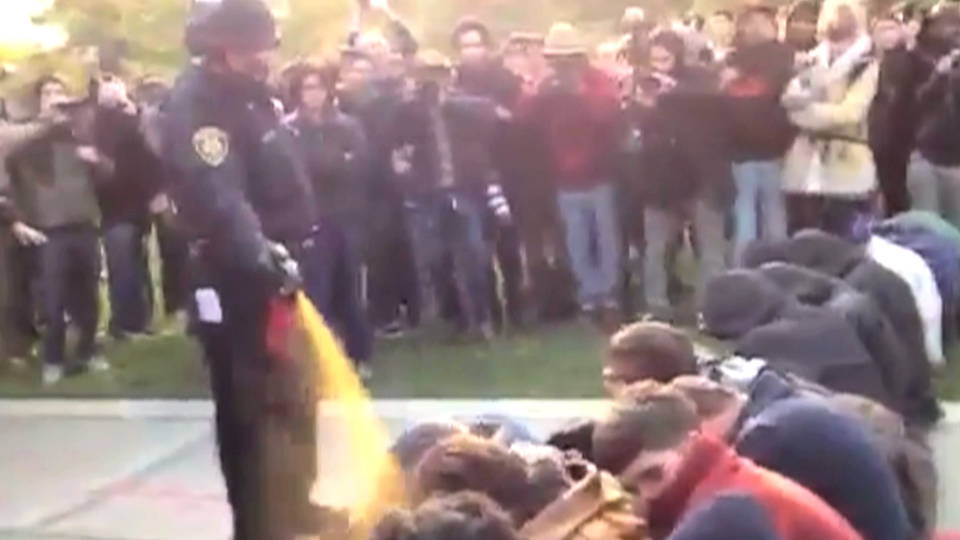
Newly disclosed documents show the University of California at Davis spent at least $175,000 to try to scrub the Internet of criticism following the 2011 pepper-spraying of student protesters by campus police. The school made national headlines after video showed police spraying seated students directly in the face at close range. The Sacramento Bee reports UC Davis paid consultants to improve its online image, in part by scrubbing negative search results related to the pepper-spray incident. UC Davis is a public university supported by taxpayer money.
TOPICS:
California
Student Protests
Dozens Arrested as UMass Amherst Students Demand Fossil Fuel Divestment
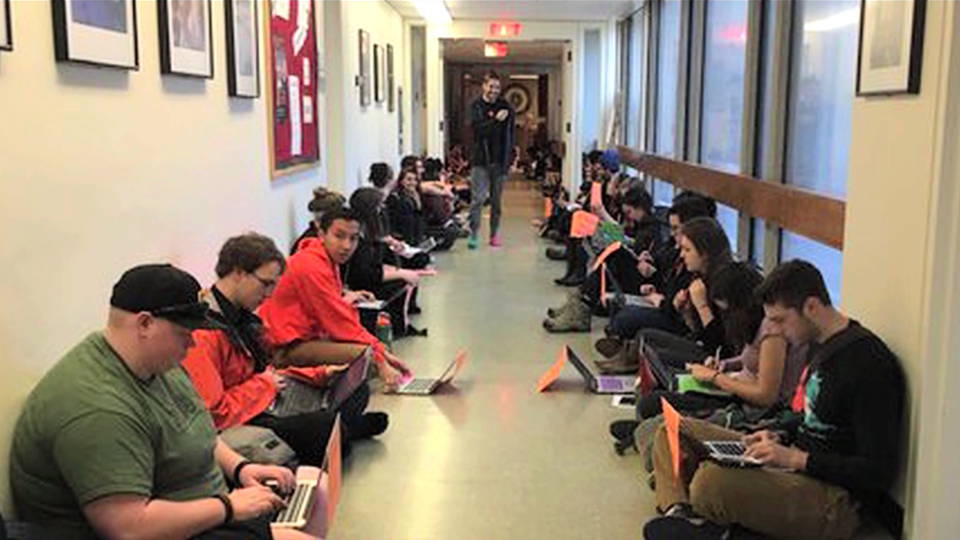
At University of Massachusetts, Amherst, about three dozen people have been arrested after launching a sit-in this week to demand the university divest from fossil fuels. Students launched their occupation of an administrative building on Tuesday. Hours later, UMass officials pledged to "advocate for a policy that would see the five-campus UMass system divest and prohibit direct investment in fossil fuel companies."
Microsoft Sues DOJ for Right to Inform Users of Spying

Tech firm Microsoft is suing the Justice Department for the right to inform users when the government is spying on their emails. The lawsuit challenges the government’s frequent use of orders barring Microsoft from telling people about government requests for their emails and other documents. It focuses on data stored on remote servers in the so-called cloud.
TOPICS:
Privacy
Canadian PM Introduces Bill to Allow Doctor-Assisted Suicide
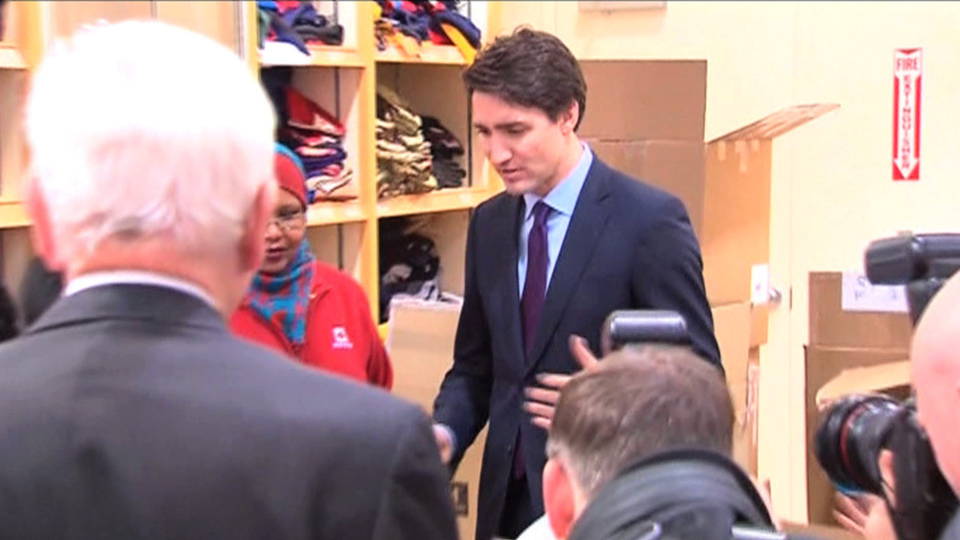
Canadian Prime Minister Justin Trudeau has introduced legislation to legalize doctor-assisted suicides for people suffering from "serious and incurable" diseases. The measure applies only to Canadian citizens and residents. Assisted suicide is legal only in a handful of U.S. states.
TOPICS:
Canada
Activists Occupy Canadian Gov't Offices to Demand Action on First Nations Suicides
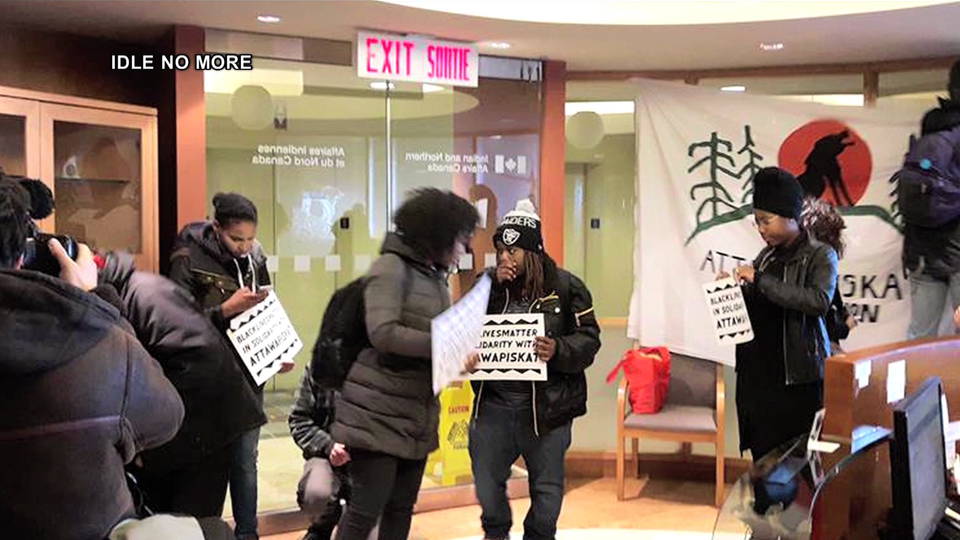
In other news from Canada, activists have occupied government offices to demand Prime Minister Trudeau visit a First Nations community rocked by a spate of suicide attempts. The Attawapiskat First Nation in Ontario saw 28 suicide attempts last month within a population of 2,000 people, and 11 attempts on Saturday alone. Activists with the Black Lives Matter and Idle No More movements occupied the Toronto offices of a government indigenous affairs agency Wednesday, while another group of activists staged a sit-in in the agency’s Winnipeg office Thursday evening.
TOPICS:
Canada
Indigenous
Mexican Woman Crosses Border with U.S. Citizen Children to Reunite Family
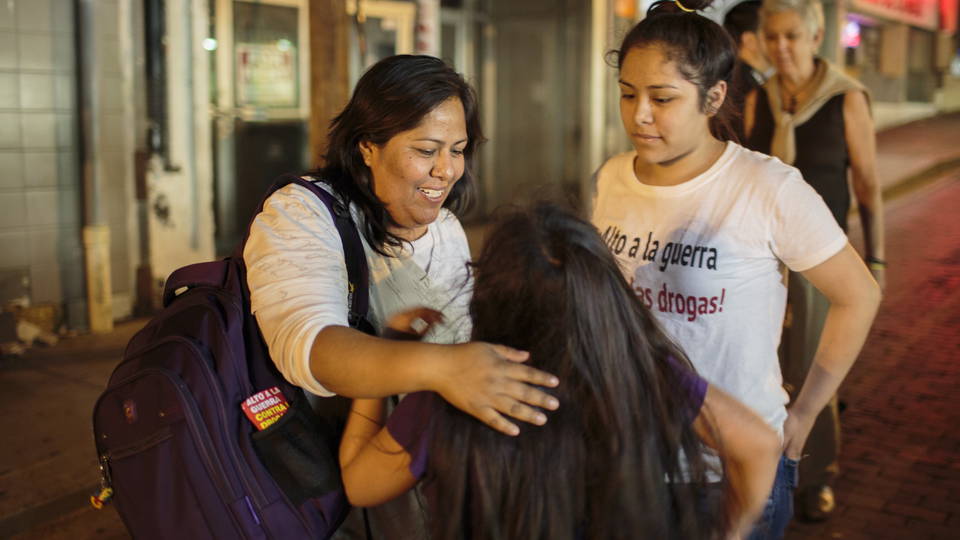
A Mexican woman has been reunited with her two U.S. citizen children after the three attempted to cross the U.S.-Mexico border together to call for authorities to end their separation. Mirna Lazcano has been unable to return to her husband and children in New York since returning to Mexico in 2013. When she attempted to re-enter the United States through the Arizona desert, she was captured and deported. This week, Lazcano’s children came to join her in Mexico as she traveled with the Caravan for Peace, Life and Justice, a group that has traveled through Central America and Mexico calling for an end to the war on drugs. Lazcano spoke out after reuniting with her daughters in Mexico.
Mirna Lazcano: "I thank God that I have my daughters here, that I can touch them now. And I thank all of you who have helped to bring my daughters here at this time. And I also want to announce that they are going to join the caravan starting today, and they are going to accompany me to El Paso tomorrow, until I turn myself in to immigration."
On Thursday, with a daughter on each hand, Lazcano turned herself in to immigration authorities in Laredo, Texas. She was later released from custody and reunited with her daughters.
TOPICS:
Immigrant Rights
Immigration
Mexican Soldiers Charged in Torture; Witness Says Federal Police Present as 43 Students Disappeared

Meanwhile in Mexico, two soldiers face military charges following the release of a video showing them helping a federal police officer torture a civilian woman during an interrogation. The video shows officers pulling the woman’s hair, putting a rifle muzzle against her head and placing her head in a plastic bag as she thrashes and nearly passes out. The interrogation took place last February in Guerrero state, the same state where 43 students went missing after an encounter with local police in September 2014. Mexico’s National Human Rights Commission confirmed Thursday a witness has reported two federal police were present when some of the students were taken off a bus and disappeared. The account bolsters earlier journalists’ reports pointing to a role by federal police as well as the Mexican military in the disappearance of the 43 students.
TOPICS:
Mexico
Donate today:
Follow:

4/15 Los Angeles, CA
4/15 Studio City, CA
4/16 Santa Rosa, CA
4/16 Willits, CA
4/16 Redway, CA
4/17 Davis, CA
4/17 Chico, CA
4/17 Berkeley, CA
4/18 Salt Lake City, UT
4/19 Idaho Springs, CO
4/19 Denver, CO
4/20 Denver, CO
4/21 Boulder, CO
4/22 Colorado Springs, CO
4/23 Eagle, CO
4/23 Carbondale, CO
4/23 Paonia, CO
4/24 Salida, CO
4/24 Taos, NM
more
DN! IN THE NEWS

TONIGHT: Don't miss Amy Goodman on HBO'sReal Time with Bill Maher Friday, April 15 at 10 p.m.
NEW BOOK

"Obama's Trillion-Dollar Nuclear-Arms Train Wreck" by Amy Goodman & Denis Moynihan
STANFORD, Calif.—“Now I am become Death, the destroyer of worlds.” These were the words from the Hindu religious text, the Bhagavad-Gita, that flashed through the mind of the man credited with creating the first atomic bomb, J. Robert Oppenheimer, as the first nuclear explosion in history lit up the dark desert sky at the Trinity blast site in New Mexico on July 16, 1945.
Weeks after that, the atomic bombing of Hiroshima, then Nagasaki, killed hundreds of thousands of civilians, and thrust the world into the atomic age. Since then, humanity has lived with the terrible prospect of nuclear war and mass annihilation. Conventional wisdom holds that the likelihood that these unconventional weapons will be used has decreased since the end of the so-called Cold War. That perception has been challenged lately, especially since President Barack Obama announced a 30-year, $1 trillion program to modernize the U.S. nuclear-weapon arsenal.
Secretary of State John Kerry visited the Hiroshima Peace Memorial Museum on Monday, the first sitting U.S. secretary of state to visit the site. Kerry was in Japan for a meeting of the G-7 nations. In his public remarks at the memorial, Kerry offered no apology for the nuclear attacks. He did say, though, that the museum “was a reminder of the depth of obligation that every single one of us in public life carries—in fact, every person in position of responsibility carries—to work for peace ... to create and pursue a world free from nuclear weapons.”
Despite the lofty rhetoric, President Obama has launched what the Alliance for Nuclear Accountability calls the “Trillion Dollar Trainwreck.” That is the title of a new report on Obama’s massive plan to modernize the U.S. nuclear-weapons arsenal, to be released next Monday. Marylia Kelley is one of the report’s authors. She serves as executive director of Tri-Valley CAREs, or Communities Against a Radioactive Environment, a partner organization with the Alliance. Of Kerry’s visit to Hiroshima, Kelley said, on the “Democracy Now!” news hour, “Kerry went empty-handed. The United States needs to go with a concrete plan to roll back its own nuclear-weapons program. You cannot preach abstinence, in terms of nuclear weapons, from the biggest bar stool in the room.”
“The United States is initiating a new nuclear arms race, because the other nuclear-armed states, of course, when they look at our ‘modernization program,’ are now beginning their own,” she told us. “We need this to be rolled back.” Kelley lives in Livermore, California, home to one of the U.S. government’s national laboratories dedicated to developing and manufacturing nuclear bombs.
President Obama delivered his first address on the U.S. nuclear arsenal on April 5, 2009, in Prague: “Today, the Cold War has disappeared but thousands of those weapons have not. In a strange turn of history, the threat of global nuclear war has gone down, but the risk of a nuclear attack has gone up. More nations have acquired these weapons. Testing has continued. Black-market trade in nuclear secrets and nuclear materials abound,” he said.
As with his pledge to close the U.S. prison at Guantanamo Bay, his pledge to move the U.S. toward nuclear disarmament seems to have been abandoned. Grass-roots groups in the Alliance for Nuclear Accountability would like to see Obama make an historic trip to Hiroshima, as the first sitting U.S. president to do so. “If Obama goes to Hiroshima,” Marylia Kelley said, “he needs to use that as an opportunity, not to speak empty promises and rhetoric about an eventual world free of nuclear weapons, but to make concrete proposals about how the United States is going to take steps in that direction and how we’re going to change course, because right now we’re taking giant steps in the opposite direction.”
The U.S. nuclear arsenal, and all the expense, nuclear waste and immense danger it continuously poses, has received almost no attention in the U.S. presidential debates. The day after he launched his campaign in late May 2015, Sen. Bernie Sanders was asked about the trillion-dollar nuclear-arsenal upgrade at a town hall in New Hampshire. “What all of this is about is our national priorities,” he replied. “Who are we as a people? Does Congress listen to the military-industrial complex, who has never seen a war that they didn’t like? Or do we listen to the people of this country who are hurting?”
In 1946, the year after Trinity, after Hiroshima and Nagasaki, Albert Einstein, whose theory of relativity gave birth to the atomic bomb, offered a warning to the world that remains starkly relevant today: “The unleashed power of the atom has changed everything save our modes of thinking and we thus drift toward unparalleled catastrophe.”
WORK WITH DN!

Boadcast Engineer
Director of Finance and Operations
WEB EXCLUSIVE

A New Nuclear Arms Race Feared as U.S. & Others Aim to Build Smaller, "More Usable" Nukes
207 West 25th Street, 11th Floor
New York, New York 10001, United States
----------------------------
----------------------------




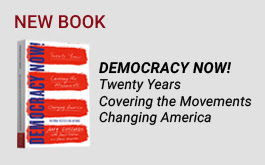

No comments:
Post a Comment